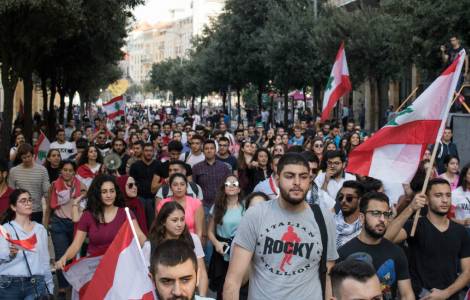Rabieh – The Churches of the Middle East are called to rediscover and reactivate at all levels their synodal vocation, if they want to preserve the transmission of the faith and their apostolic traditions to the younger generations in the midst of the turmoil and crises that are shaking Middle Eastern societies. This is the message that emerged from the meeting of young Lebanese Christians who gathered from Friday 4 to Sunday 6 March, to reflect together on how the synodal journey initiated in the Catholic Church can represent a favorable circumstance for enhancing the contribution of young people to ecclesial and civil life in the countries of the Middle East. The meeting, sponsored by the Pro Oriente foundation and by theologians and theologians of the ecumenical team Nakhtar al Hayat (“Let’s choose life”), represents only the first stage of a journey destined to continue with similar meetings scheduled between April and June in Jordan, Palestine and Egypt.
The Rabieh meeting was attended by 25 young people belonging to different Churches and ecclesial communities and coming from different regions of the country. Sister Emilie Tannous, Viola Raheb (local leader of Pro Oriente), the Lebanese Greek-Melkite theologian Father Gabriel Hachem, member of the International Theological Commission, and Maronite priest Rouphael Zgheib, National Director of the Pontifical Mission Societies in Lebanon participated in the various working sessions. During the days of study and shared reflection – reports a summary of the work sent to Agenzia Fides – it became clear that the so-called synodality is not an abstract model of the functioning of the ecclesial apparatus, elaborated by mimicking the systems in place in political bodies. The Synod – as the Greek root of the word suggests – is a “walking together”, but in its ecclesial sense the journey is real only if it is the Holy Spirit who “walks together” with the Church. The participants in the meeting drew the most appropriate images from Holy Scripture to suggest what the synodal “walking” of the Church is.
Images such as those offered in the Old Testament, with the story of God accompanying the journey of the chosen people to the Promised Land, or the Gospel images of Jesus walking through the streets of Palestine, with his disciples and the multitudes who flock around him to implore signs of salvation; or, again, the references to the Holy Spirit who, after the resurrection of Christ, does wonders by “walking” with the disciples who begin to confess and bear witness before the world of the proclamation of the Gospel, and by leading the nascent Church towards the fullness of the Kingdom of God. If the synod means “walking together” in the midst of the circumstances of history, the discussion among the young people gathered in Rabieh highlighted the fact that the synodal journey challenges each baptized person, who is called to “walk together” with his brothers and sisters to announce the Gospel in its time, in the occasions and situations that mark its daily life. For this reason, synodality is an “adventure” to be undertaken only in the company of the Holy Spirit, listening and following what the Spirit shows and communicates along the way”.
The “working tool” of the various sessions of the Rabieh meeting was the dense document on the present and future condition of the Christian communities of the Middle East written by the theologians of the ecumenical team Nakhtar al Hayat (“Let us choose the life “) at the end of last September, entitled “Christians in the Middle East: for a renewal of theological, social and political choices” (see Fides 28/9/2021). “Most of the historic Churches of the Middle East”, underline the authors in this text, “are patriarchal or synodal. Both systems are inspired by the idea of synodality which, in its primary sense, refers to communion and to walking together”. These traditional features of the ecclesial life of the communities of the East must be recovered today, when “unfortunately today, in our Churches, we often see the people of God – especially women and young people – marginalized in important decisions”.
The Christian boys and girls gathered in Rabieh repeated that, despite all the fears looming over their present and their future, they want to escape the logic of the “besieged minority”. During the various working sessions, the problems and difficulties that affect the condition of young people in Middle Eastern societies were addressed, including phenomena such as the weakening of ties with one’s own community of faith, the individualism, the loss of personal faith, the perception of one’s own marginality in relation to ongoing social processes, in a context of growing political instability and economic impoverishment.
Source: Agenzia Fides






